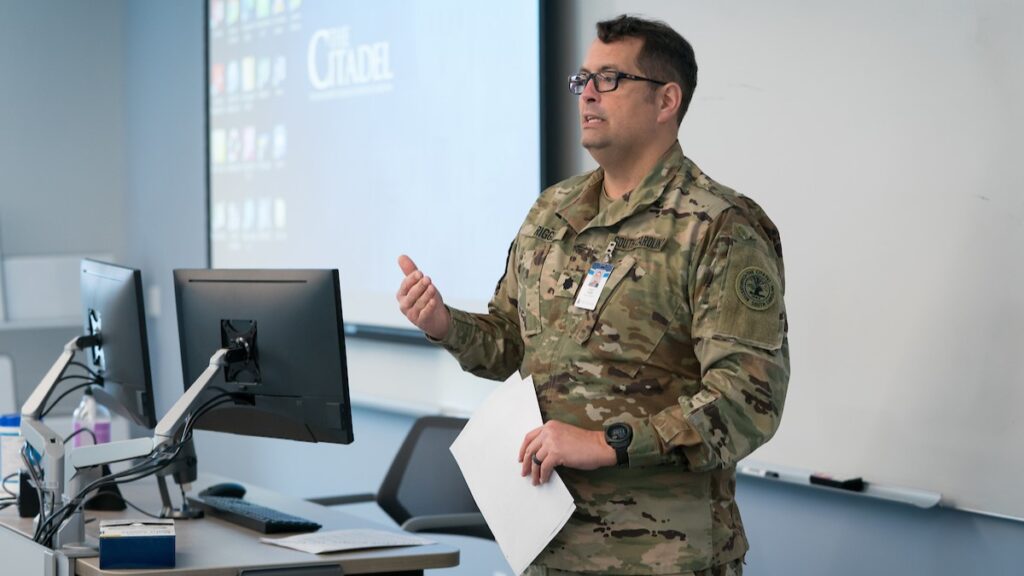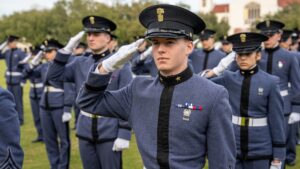
Robert “Bob” Riggle, Ph.D., is a professor and the head of the Department of Marketing, Supply Chain Management and Economics at The Citadel. He holds a Ph.D. in Marketing from the University of South Florida, as well as a Master of Business Administration and B.A. in Public Administration from Henderson State University in Arkadelphia, Arkansas. Riggle’s current teaching and research interests include professional selling and sales management, sales leadership and quantitative methods. Prior to working on his Ph.D., Riggle held sales positions with Naylor Publications and Coca-Cola Enterprises. In addition to his academic duties, he has worked as consultant or subject matter expert in projects for McDonald’s Corporation, Caterpillar, Water Missions International, The Charleston Historic City Market/City Market Preservation Trust, Wal-Mart, the Federal Bureau of Investigation and many additional small business or startup firms.
Cadet Zoe Crecos, the current Regimental Public Affair’s Officer for the South Carolina Corps of Cadets, chose Riggle as a campus leader to interview.
Read more from their conversation below.
Tell me a bit about your journey that led you to academia and what inspired you to specialize in Marketing?
I never planned to go into academia. I didn’t really know what sort of job I wanted to do, but I was always interested in government and politics. So, I leaned towards political science before a friend of mine told me about public administration, where you could work as a city manager or some sort of other government job, and I thought that sounded really interesting. I started taking some business classes and I found that I was interested in that kind of topic along with political science. When I finished my undergraduate degree, I had an opportunity to go straight into an MBA program, and when I finished that, I went into corporate. I worked in several different types of sales roles – selling jewelry, watches and advertising space in different publications – and through those experiences I learned that I don’t really want to be stuck in an office all the time. A job at Coca-Cola came up and I applied for it, and there I learned a lot about supply chain, corporate sales, key account sales and managing relationships within the supply chain. I got a call one day from a former professor of mine who had become the dean at my alma mater, and he was looking for somebody to teach marketing and sales. So, I applied and I got the job. Before that, I didn’t think I wanted to get a Ph.D., but I enjoyed the teaching so much, and so early, that I felt like I needed one in order to keep teaching. So that’s when I went on to the University of South Florida to get my doctorate in marketing.
Before working at The Citadel, you worked in different positions during your career. How did those roles shape your approach to teaching today?
Before I came to The Citadel, I was at Northern Illinois University, where I was a marketing professor. That was my first real job out of my Ph.D. program. I had five or six years of teaching experience and I felt really good in the classroom. And I was teaching hard classes like marketing, research and marketing strategy. I also worked at Dillard’s in the fashion jewelry, fine jewelry and watches area for a time. I really felt like that helped me learn that sales was a natural fit for me. I sold more watches than anyone else in the time that I was there. I was able to close the deals and keep my numbers up, and it put me in a position to work in advertising sales, where I was an account manager for Naylor Publications in Gainesville, Florida. I worked at Naylor for a while, and I had a really good sales training there. They had mastered training someone without a sales background into being a business-to-business representative for them. It made me kind of bored, since that type of role is constantly on the phone. I did decent with that, but I was stuck in a cubicle making phone calls day after day after day. But I learned and I was able to hone my skills in selling through that process. We started out with scripts, and that made sure that we hit all the important points of the sales process, but quickly I was able to kind of develop my own style while also hitting all of those all of those points. I was working with someone whose husband was a sales manager at Coca Cola for Central Florida, and he told me about some of the things that Coca Cola was doing, and I felt like it was an opportunity to get into an outside sales role and be out working with customers. I learned a lot about the supply chain side of managing drivers, managing merchandisers and managing different programs for different types of products. And that has been really helpful in providing examples in the classroom as well as coaching students.
What led you to transition from corporate roles at companies like Coca-Cola to a career in teaching and research?
Going into teaching was not something on my radar. When I was getting my MBA, I was a grad assistant for several professors, and through my interactions with them I saw what a professor needs to be successful. But then the next piece was research, and I did not think I would be interested in it at all. After going into the upper-level statistics courses, which I never really excelled at in undergrad, I kind of got my act together in my last year of undergrad and I learned how to study. Going into the Ph.D. program, you have to reformat how you think. I really do enjoy the qualitative side of research, but I enjoyed also the statistics as well as learning and implementing new knowledge that I’ve been gaining in different statistical techniques. Of course I never thought that this would be where I would end up. If you’d ask anybody who I graduated high school with what would I be doing, they would say probably something in marketing or sales, or politics or government, because those were the things that I gravitated most to, but not being a professor and certainly not being a researcher.
How do you think The Citadel’s military structure and environment improves or influences your teaching?
One of the things that I appreciate about The Citadel, when it comes to the military side, is how it prepares students for rejection in sales. People are going to have rejection and it’s something that is natural. It’s something that you should get used to. At other schools where I’ve taught sales, the fear of rejection was pretty high, but one of the things I noticed early on here at The Citadel is cadets and students are kind of used to hitting that brick wall but continuing to push forward. And I think that grit or perseverance really does set Citadel students up for really successful careers, specifically in sales and, subsequently, what I’ve seen is some really great success stories.
Can you share an experience from The Citadel where you felt you had a meaningful impact on a cadet’s journey?
I see students coming back or following up with me once they’ve gotten into a job and are experiencing real life firsthand. The impact that I’m able to have for students is helping prepare them in some small way to know what to expect when they get out of here. There’s no easy way to put this, but real life is difficult and a job is very difficult, and it requires a lot of dedication, perseverance, repetition and just being able to take rejection and not let it be personal.
How do you define effective leadership as a professor and department head at The Citadel?
I think leadership starts at the top. And leadership is critical for the success of any organization. The Citadel is unique in that we really do practice what we preach. We expect high levels of leadership traits or skills of our faculty, staff and administration as well as from our cadets and students. The Corps of Cadets has leadership positions and those positions have responsibilities. And I’ve had senior privates all the way to the regimental commander in my classes over the years. It’s important that you’re able to illustrate to people exactly what it is that you’re doing, because most people don’t understand a military environment and the types of things that you do to lead your peers. And that’s a very difficult position. I think also from an academic side, leadership can be defined as taking personal responsibility for your successes and failures. Showing up on time, being dedicated to the learning process, being respectful of your peers as well as your professors and giving everything that you have to the best of your ability to get the job done. The Citadel does a good job at giving students as much as they can handle because, while you think it’s difficult now and what you’re doing now is overwhelming, the reality is that when you go into the real world, the responsibilities increase exponentially. And you look back at college and you think, “Wow, I wish now I only had the things that I had to deal with then.” The Citadel does a good job of teaching students learn how to balance and manage time.
In what ways do you mentor or support students who are interested in pursuing careers in marketing or sales?
I talk with students daily about different career ideas that they’re interested in pursuing. One of the things I really try to harp on in my classes is that, if you know what industry you’re interested in going into, you should really start learning that industry as soon as possible. Because the thing that’s going to set you apart when you get out onto the job market is being able to have a high-level conversation with someone who’s in that industry while showing them that you know some of the current events that are going on, some of the things that are facing that industry, some of the things that are new. Having an understanding of the industry helps set a student apart. So, I really try to counsel students on that. I also tell them to get an internship or find out what kind of sales they want to do, because there’s all kinds of different sales jobs. I think that an internship that will help a student learn what they want to do and what they might not want to do.
Cadet Zoe Crecos is the Regimental Public Affairs Officer for the South Carolina Corps of Cadets. Crecos, who is from Palm Beach, Florida, is a Marketing and Business Development major with a minor in Data Science. When she graduates, she will be pursuing a career in Supply Chain Management.

 Looking ahead to the major events of 2026-27
Looking ahead to the major events of 2026-27 Photos from campus: January in review
Photos from campus: January in review Upcoming News from The Citadel – February 2026
Upcoming News from The Citadel – February 2026

